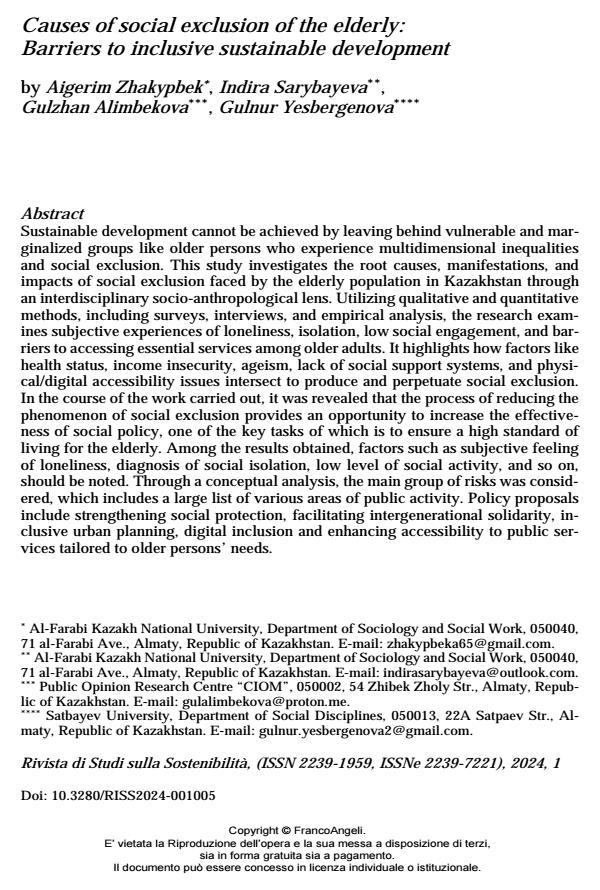Causes of social exclusion of the elderly: Barriers to inclusive sustainable development
Journal title RIVISTA DI STUDI SULLA SOSTENIBILITA'
Author/s Aigerim Zhakypbek, Indira Sarybayeva, Gulzhan Alimbekova, Gulnur Yesbergenova
Publishing Year 2024 Issue 2024/1
Language English Pages 18 P. 65-82 File size 116 KB
DOI 10.3280/RISS2024-001005
DOI is like a bar code for intellectual property: to have more infomation
click here
Below, you can see the article first page
If you want to buy this article in PDF format, you can do it, following the instructions to buy download credits

FrancoAngeli is member of Publishers International Linking Association, Inc (PILA), a not-for-profit association which run the CrossRef service enabling links to and from online scholarly content.
Sustainable development cannot be achieved by leaving behind vulnerable and marginalized groups like older persons who experience multidimensional inequali-ties and social exclusion. This study investigates the root causes, manifestations, and impacts of social exclusion faced by the elderly population in Kazakhstan through an interdisciplinary socio-anthropological lens. Utilizing qualitative and quantitative methods, including surveys, interviews, and empirical analysis, the research examines subjective experiences of loneliness, isolation, low social en-gagement, and barriers to accessing essential services among older adults. It high-lights how factors like health status, income insecurity, ageism, lack of social support systems, and physical/digital accessibility issues intersect to produce and per-petuate social exclusion. In the course of the work carried out, it was revealed that the process of reducing the phenomenon of social exclusion provides an oppor-tunity to increase the effectiveness of social policy, one of the key tasks of which is to ensure a high standard of living for the elderly. Among the results obtained, factors such as subjective feeling of loneliness, diagnosis of social isolation, low level of social activity, and so on, should be noted. Through a conceptual analysis, the main group of risks was considered, which includes a large list of various areas of public activity. Policy proposals include strengthening social protection, facili-tating intergenerational solidarity, inclusive urban planning, digital inclusion and enhancing accessibility to public services tailored to older persons’ needs.
Keywords: diagnostics, overcoming, old age, social problems, age groups, age inequality, support.
Aigerim Zhakypbek, Indira Sarybayeva, Gulzhan Alimbekova, Gulnur Yesbergenova, Causes of social exclusion of the elderly: Barriers to inclusive sustainable development in "RIVISTA DI STUDI SULLA SOSTENIBILITA'" 1/2024, pp 65-82, DOI: 10.3280/RISS2024-001005